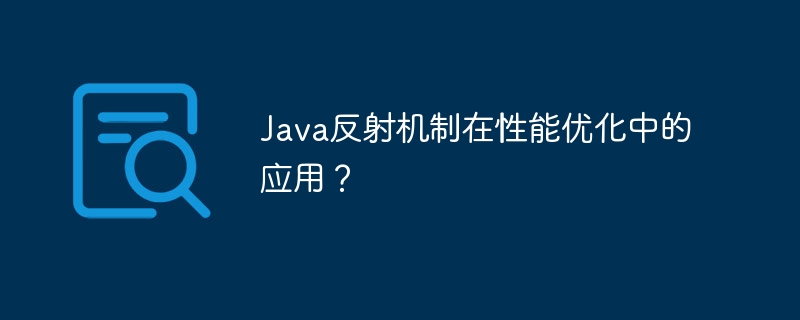
Answer: Using the Java reflection mechanism can optimize performance, but it is necessary to avoid abuse and performance losses. Detailed description: The reflection mechanism brings performance overhead, including loading classes, looking up methods/fields, and calling methods/accessing fields. Best practices include avoiding repeated reflections, reducing reflection scope, using implicit reflection, and trading off performance versus flexibility. Practical cases include automatic boxing and unboxing, dynamic method calling and dynamic class loading, optimizing performance by using the reflection mechanism.

Application of Java reflection mechanism in performance optimization
Introduction
Java The reflection mechanism allows programs to inspect and dynamically modify the structure of a class. While reflection is a powerful feature, misuse of reflection can adversely affect performance. This article will discuss how to use Java reflection mechanism wisely in performance optimization and some practical cases.
Performance overhead of the reflection mechanism
When using the reflection mechanism, you need to remember the following performance overhead:
Best Practices
To minimize the performance overhead of the reflection mechanism, follow these best practices:
Practical cases
The following are some practical cases of using the reflection mechanism to optimize performance:
Conclusion
The Java reflection mechanism is a powerful tool that plays a role in performance optimization. By following best practices and trading off performance and flexibility, you can take advantage of the benefits of reflection while minimizing its performance overhead.
The above is the detailed content of Application of Java reflection mechanism in performance optimization?. For more information, please follow other related articles on the PHP Chinese website!
 How to withdraw money on WeChat without handling fees
How to withdraw money on WeChat without handling fees What happens when software crashes?
What happens when software crashes? Mobile hard disk partition software
Mobile hard disk partition software The difference between bond0 and bond1
The difference between bond0 and bond1 Windows cannot complete formatting hard disk solution
Windows cannot complete formatting hard disk solution number_format usage
number_format usage Top ten digital currency exchanges
Top ten digital currency exchanges What are the calling methods of java reflection
What are the calling methods of java reflection



